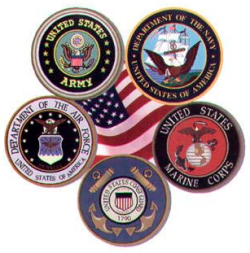Fighting the War at home: Cumberland County Veterans Treatment Court
 It’s not every day that you hear of a judge spending the night in jail with someone he has sentenced. However, in April of 2016 that’s exactly what happened. District Court Judge Lou Olivera displayed the ultimate act of compassion when he spent the night in jail with former soldier Joseph Serna.
It’s not every day that you hear of a judge spending the night in jail with someone he has sentenced. However, in April of 2016 that’s exactly what happened. District Court Judge Lou Olivera displayed the ultimate act of compassion when he spent the night in jail with former soldier Joseph Serna.
Judge Olivera runs the Cumberland County Veterans Treatment Court. The treatment court is a program that aims to help veterans who keep appearing in the court system for particular reasons. The court team includes lawyers, judges, law enforcement, substance abuse and mental health providers as well as a team of volunteer mentors.
Program coordinator Craig Shore described the program as “walking a fine line between jurisprudence and treatment, advocacy and accountability.” We had the opportunity to learn more about the Veterans Treatment Court program and its work to serve those who have served.
LM: Can you tell us a little bit about how the treatment court was started?
CS: The VTC was started in 2008 in Buffalo, NY by Honorable Robert Russell who noticed that the veterans coming into his court were presenting with a unique set of circumstances. He recognized the need to not only address the criminal issues but the treatment aspect as well. Many veterans have substance abuse problems, mental health issues, or PTSD/TBI. He realized these issues may have contributed to criminal behavior. They have discovered that if the treatment issues are addressed, the rate of recidivism drops dramatically. There are approximately 300 VTCs in the country.
(If you would like more historical information, please go to the Buffalo VTC website)
LM: Who is involved in the program as far as the day-to-day management and how can those who wish to get involved with the work you’re doing help?
CS: The VTC is managed by the VTC Coordinator who is responsible for determining eligibility, accomplishing intake interviews with prospective candidates, creating the court docket, coordinating the drug testing program, public relations, grant writing, etc. The Treatment Team is comprised of the Judge, VTC Coordinator, ADA, Public Defender, VA liaison, law enforcement, Mentor Coordinator, Probation, and Community Mental Health Provider. The team is in constant contact with each other as the dynamics of the population we work with is ever changing.
We are planning to establish a “Friends of the VTC” group. These are people who have no military affiliation but desire to help. Their primary mission will be to address issues with the participant’s family or significant others.
LM: How involved is the Cumberland County Bar in the work of the treatment court?
CS: We have made presentations to the Cumberland County Bar at their monthly meetings. The members of the bar have become more familiar with the concept and applicability to their practice and have been referring in greater numbers.
LM: Cumberland County is the location of one of the largest military installations in the U.S. What is the relationship between the military and the community? Has the treatment court helped the relationship or opened doors for new relationships?
CS: I believe there is an excellent relationship between Ft. Bragg and the military community. We recently had a military affiliated attorney volunteer to provide legal advice and limited services to ID card holders. The attorney has already helped one of our participants.
LM: I understand there’s a mentorship component of the program. Can you tell me more about the mentors and the work they do with the veterans?
CS: Anyone who has served honorably in the military can become a Mentor. Mentors are trained to provide a listening ear to their mentee. Mentors must pass a background check to be eligible. Mentees must meet with their Mentors once a week for the duration of their involvement in the program (15-18 mos.) Mentors will meet with their mentees for lunch/dinner, fly model airplanes, play guitars together and a host of other positive socialization events.
LM: What success has the treatment court experienced? Has the program undergone any major changes since its 2014 opening?
CS: The Cumberland County program has graduated 4 participants since its first docketed case two years ago. Outside observers must be mindful that the program is 15-18 months in duration. During a participants time in the programs there may be setbacks involving the repeating of a phase. Our first graduate is maintaining sobriety, has had no further criminal involvement and is working full time in the VA hospital in Fayetteville There was positive national notoriety after our Judge spent the night in jail with one of our participants. No major changes to speak of, refining what we have in place to meet the needs of the court and its participants.
LM: I would imagine that being a part of a program such as the treatment court is very rewarding. On a personal note, what would you say is the most rewarding aspect of your job?
CS: The most rewarding aspect of the job, for all Treatment Team members, is being an agent for positive change. When our advocacy or response to a set of circumstances leads to growth on the participants part, therein lies our gratification. Our desire, when a client is involved in the program, is to collaborate with the client in laying the groundwork for change. There is no higher calling than to share in and witness the positive outcomes.



